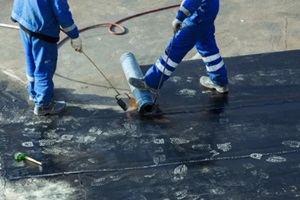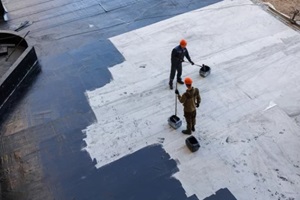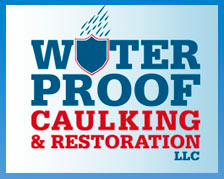 Proper waterproofing is essential to protect Delaware’s historic commercial buildings and ensure their preservation for future generations. As an owner of an aging commercial structure in Delaware needing waterproofing services, it is important to balance protection and architectural preservation when selecting solutions.
Proper waterproofing is essential to protect Delaware’s historic commercial buildings and ensure their preservation for future generations. As an owner of an aging commercial structure in Delaware needing waterproofing services, it is important to balance protection and architectural preservation when selecting solutions.
The right Delaware commercial waterproofing approach involves special considerations to maintain heritage value while providing structural reinforcement against water damage.
Special Considerations for Waterproofing Historic Commercial Structures
Waterproofing historical buildings requires careful consideration to maintain their aesthetic appeal and historical significance. Here are some key factors to keep in mind:
Preserving Architectural Integrity
When selecting waterproofing solutions, opt for products that will not alter the visual character of your building. For instance, liquid-applied membranes can provide an invisible layer of protection. Preservation of original architectural details should take priority.
Prioritizing Breathability
Historic buildings were often constructed with natural materials such as stone, brick, and wood, which need to “breathe” and release moisture. Using vapor-permeable waterproofing systems allows water vapor to evaporate from the building fabric.
Evaluating Substrate Materials
Consider factors such as porosity, strength, and composition of substrate materials before choosing a waterproofing method. For instance, lime plaster substrates require a different approach than brick or granite.
Allowing Accessibility for Future Maintenance
Waterproofing solutions for historic buildings should allow inspection and maintenance access to detect potential issues early. Facade coatings, for example, can be reapplied after inspection.
Consulting Preservation Guidelines
Review federal and state historic preservation standards before selecting any products. The waterproofing strategy should align with these guidelines to retain heritage status.
Planning for Ongoing Upkeep
Maintenance plans must be implemented over historic buildings’ lifecycles to ensure waterproofing systems remain effective in the long run.
Common Water Damage Risks in Old Commercial Buildings
Neglecting waterproofing needs in old commercial buildings can lead to various deterioration and damage. Here are some of the most common risks:
Leaking Roofs
 Aging roofing materials such as terracotta tiles and slates in historic buildings can crack and warp over time, leading to water infiltration. Regular inspections and roof maintenance are key.
Aging roofing materials such as terracotta tiles and slates in historic buildings can crack and warp over time, leading to water infiltration. Regular inspections and roof maintenance are key.
Rising Damp
Moisture from the ground moving upward into porous masonry causes rising dampness, eroding wall materials and coatings. Installing a damp-proof course helps guard against this issue.
Plumbing Leaks
Leaky supply lines, valves, and fittings in old plumbing systems allow water seepage. Replacing worn plumbing components and pipes can address this.
Cracks in Masonry
Widened gaps, cracks, and missing mortar in aging brick or stone walls and foundations provide an entry point for water. Repairing cracks and sealing gaps limits water penetration.
Ineffective Drainage
Insufficient slope, clogged drains, or leaky downspouts lead to water buildup and moisture damage on exterior surfaces and interiors. Improving drainage deters water retention.
Waterproofing Solutions for Delware’s Historic Commercial Buildings
There are several effective waterproofing solutions suitable for sensitively restoring historic structures while retaining their charm:
Breathable Coatings
Lime-based mineral coatings allow water vapor transfer while creating a protective barrier against liquid water. These breathable coatings are compatible with masonry substrates.
Liquid-Applied Membranes
Seamless rubberized asphalt or polyurethane coatings adhere well to substrates. These elastomeric membranes bridge cracks and provide reliable waterproofing without altering aesthetics.
Cavity Drainage
Installing cavity drain membranes on foundations creates a path to divert away moisture. This relieves water pressure behind walls, preventing further damage.
Crack Repair
Injecting epoxy resin fillers into cracks and crevices seals them while adding structural reinforcement. This stops water entry points without major intervention.
Interior Climate Control
Maintaining optimal indoor temperature and humidity levels through HVAC systems preserves interior finishes and mitigates moisture damage.
Consulting Delaware Commercial Waterproofing Professionals
Seeking expert guidance is advised when waterproofing vintage commercial structures. Qualified professionals will evaluate your building’s unique needs and characteristics to recommend solutions. Here are some key steps for consulting specialists:
- Research contractors thoroughly and choose those experienced in working on historic buildings. Ask for portfolio samples and references.
- Have a preservation architect assess which methods best conserve your building’s architectural integrity.
- Request your contractor to prepare a detailed waterproofing plan in line with preservation standards. This plan should identify problem areas, address root causes, and outline protection measures.
- Utilize the knowledge of experts to diagnose deterioration issues that may not be visible. They can recommend appropriate rectification measures.
- Verify qualifications and certifications of contractors to ensure they are permitted to work on historic registered properties.
Safeguarding Delaware’s Commercial Legacy
As a steward of historic architecture, it is important to take the necessary steps to safeguard your aging commercial building’s structural health and heritage value. Consider the following:
 Accept your responsibility to implement sensitive preservation and maintenance practices. Proper waterproofing is a key facet of this.
Accept your responsibility to implement sensitive preservation and maintenance practices. Proper waterproofing is a key facet of this.- Recognize waterproofing not just as a cosmetic fix but as central to reinforcing structural stability and longevity.
- Choose solutions that strengthen protection against water damage without compromising the building’s character.
- Promote awareness of Delaware’s distinctive architectural heritage by sharing your preservation efforts with the local community.
- Set an example for other owners to follow by prioritizing the conservation and care of your historic treasure.
Get In Touch with Delaware’s Commercial Waterproofing Experts
Caring for aging commercial buildings with proper waterproofing helps retain Delaware’s architectural past for future generations to enjoy. By protecting and promoting historic structures, you are helping add to the continuing story of the First State’s rich cultural landscape.
Partnering with experienced waterproofing experts such as Waterproof Caulking & Restoration can support you in this important stewardship while saving Delaware’s grand historic buildings.
Contact us today at 484.265.9646 or schedule a consultation online to discover how we can help you preserve your historic commercial building with customized Delaware commercial waterproofing solutions.
